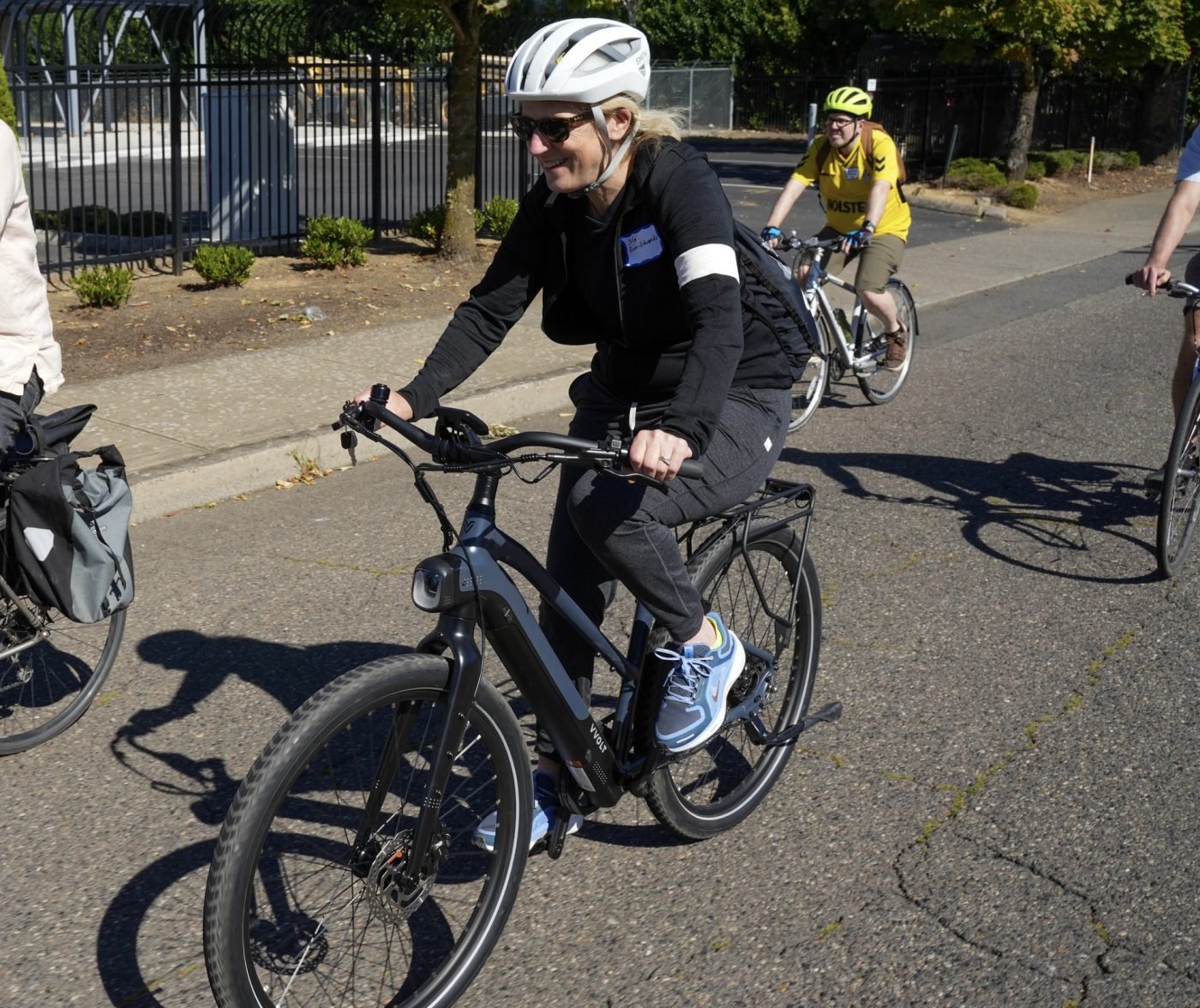
New research on electric bike rebates — released the same week the City of Portland announced a soft launch of their program — is good news for fans of using government subsidies to make e-bikes cheaper.
A study from University of British Columbia found substantial environmental, economic, and quality of life benefits in people who received rebates from the BC Electric Bike Rebate Program launched in 2023. Beyond the serendipitous timing of this research, it has another strong Portland connection: One of the study’s researchers, UBC Associate Professor Dr. Alex Bigazzi, is a graduate of Portland State University whose work on cycling and air quality made several headlines here on BikePortland.
In Travel, Environmental, and Equity Impacts of Income-Conditioned E-Bike Rebates in British Columbia by Polina Polikakhina, Amir Hassanpour, Kyla Yu, Meghan Winters, and Bigazzi (2025, with funding by Social Sciences and Humanities Research Council of Canada (SSHRC) & Mobilizing Justice) surveyed over 1,000 BC program participants for over one year. By nearly every metric, the ability to add an e-bike to their lives had significant positive benefits to their personal well-being and the world around them. The study found that:
- Emissions from travel dropped 17 per cent per year overall, equivalent to 1,000 tonnes of carbon dioxide
- Travel costs fell 12 per cent
- Post-purchase automobile use fell by 20% while e-bike use increased by a factor of 16
- Physical activity during travel rose 13 per cent
- Rebates cut e-bike purchase costs by 43 per cent, with the greatest benefits going to lower-income households
- $6.5 million in rebates generated $8.7 million in new retailer revenue.
The BC program offers rebates of $350 to $1,400 depending on personal income qualifications. The study tracked many statistics about participants including: purchase decisions, use of purchased e-bikes, and short-term (three months) and long-term (12 months) travel behavior changes post-purchase.
Among the findings is that folks who used the rebates purchased bikes with an average price of $3,200 (paying an average of $1,900 after the rebate). “E-bike price was inversely related to rebate value, showing that the rebates were primarily used to decrease cost rather than to acquire more expensive e-bikes,” the study summary reads.
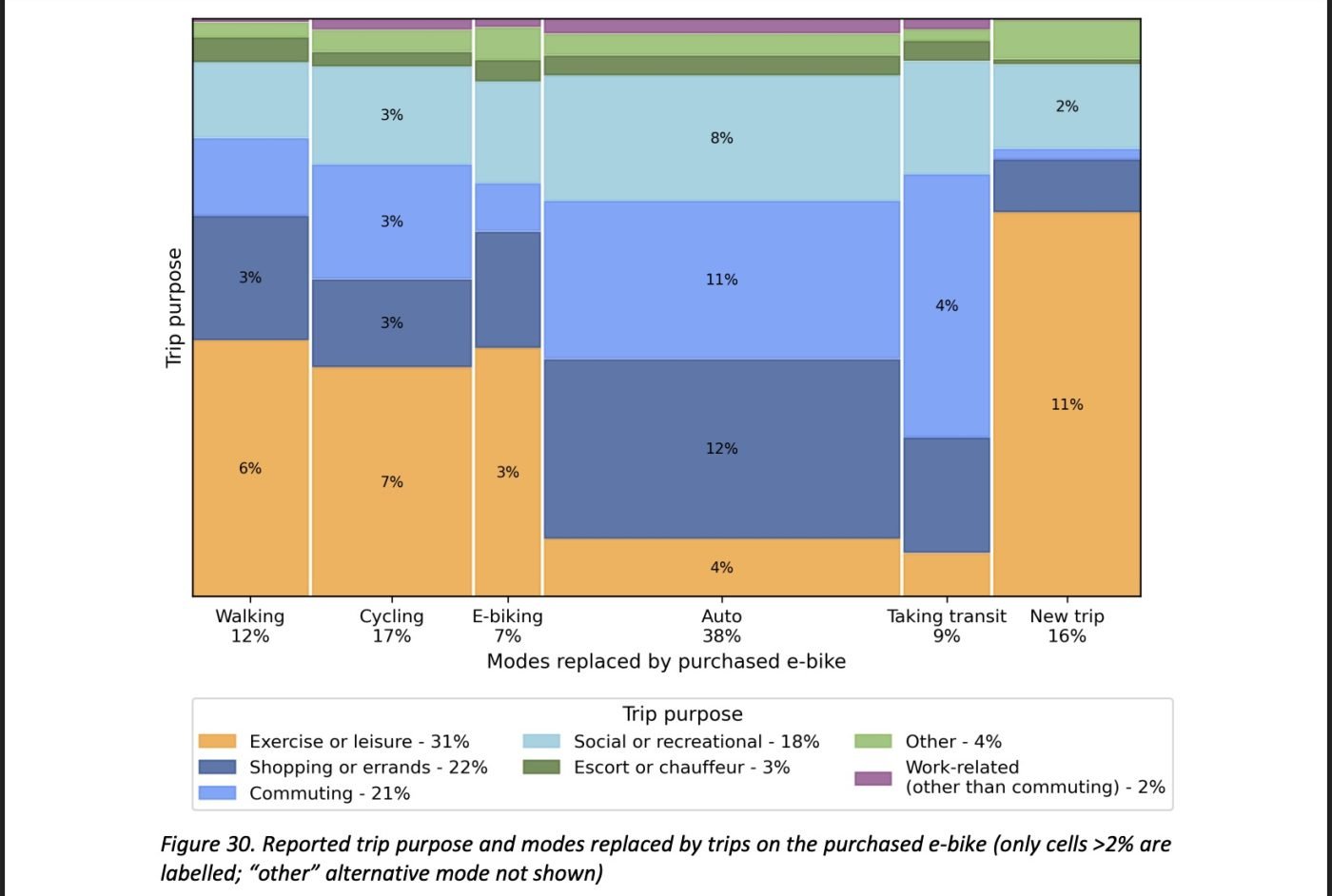
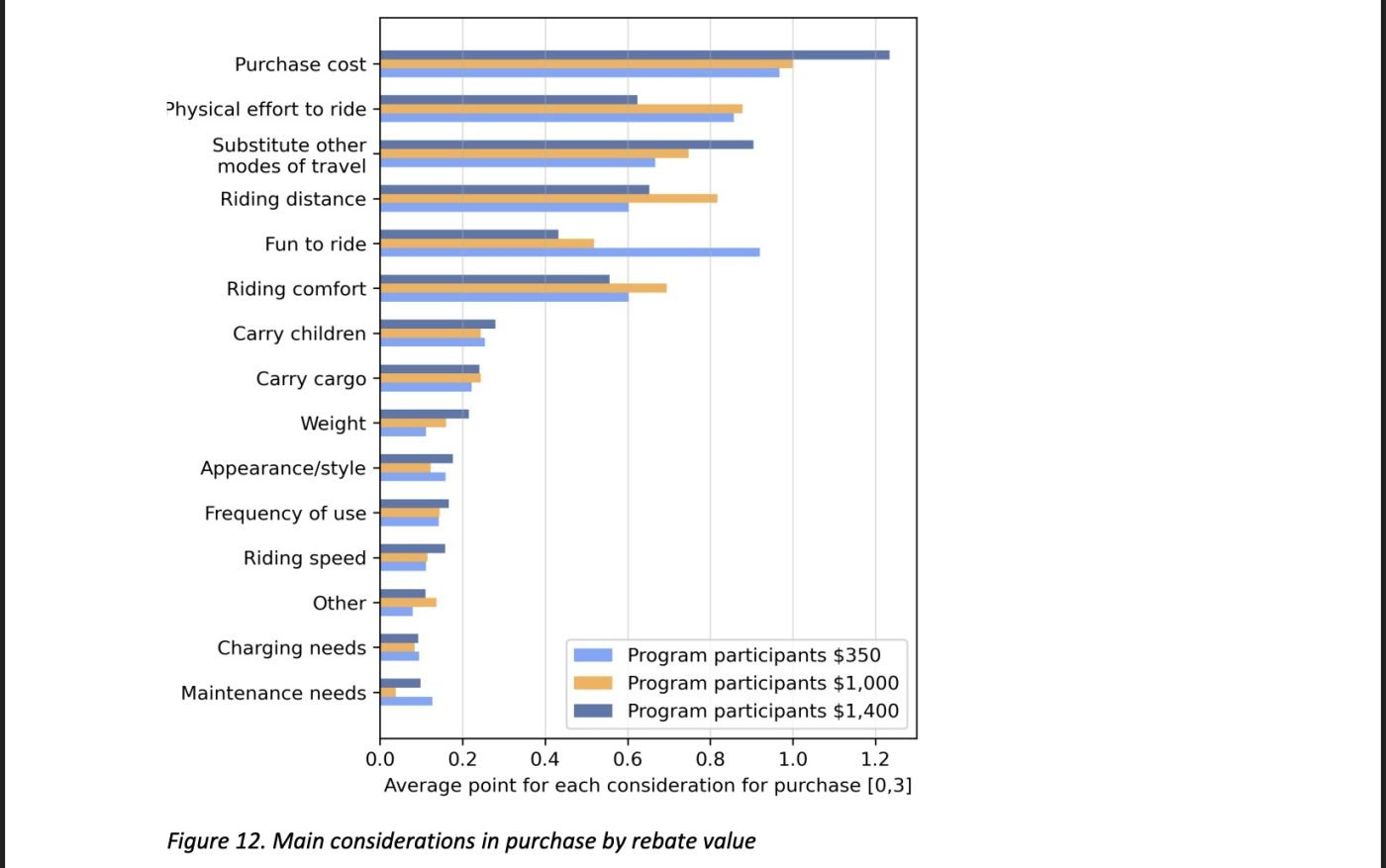
Using demographic data, researchers found that reductions in automobile use were greater for those with higher household income and those living in suburban areas that are relatively dense but with poorer access to destinations by walking, cycling, or public transit. Increases in e-bike use were also greater for those with lower household income and those living in hillier areas.
Along with demographic data, the study provides recommendations for how to make them work even better.
Given behaviors of rebate recipients, researchers say geographic prioritization is worth considering, because places with things like hillier terrain and limited public transit options will have greater rebate impacts. This seems to be fodder for a special rebate dispensation to folks who live in the southwest/west hills.
It has always bugged me that politicians seem to have no problem supporting e-car rebates, but balk at doing the same for e-bikes. I know it can’t fight the power of motonormativity, but this study found e-bike rebates are cost-competitive with car rebates for GHG mitigation. But wait, there’s more: “[E-bike rebates] also generate a range of other important benefits through automobile mode substitution and increased physical activity.” So yeah, e-bike rebates actually have more bang-for-our-buck than e-car rebates. The study should also serve as a reminder to never limit framing e-bike rebate benefits as solely a climate change fighting tool. “Considering mobility and physical activity co-benefits will be increasingly important if declining automobile emission rates diminish the effectiveness of e-bike rebates for GHG reduction,” researchers write.
“E-bikes bring benefits to users in cost, mobility and physical activity,” said study co-investigator Dr. Meghan Winters of Simon Fraser University. “But the impacts of this rebate program are also more broad, with societal benefits of reduced emissions, replacement of car trips, and generated revenue.”
And to top it all off, rebate users cited “fun and enjoyment” as one of the top reasons they were eager to hop on an e-bike.
— View an article on the study by UBC which has links to the study summary and full report.



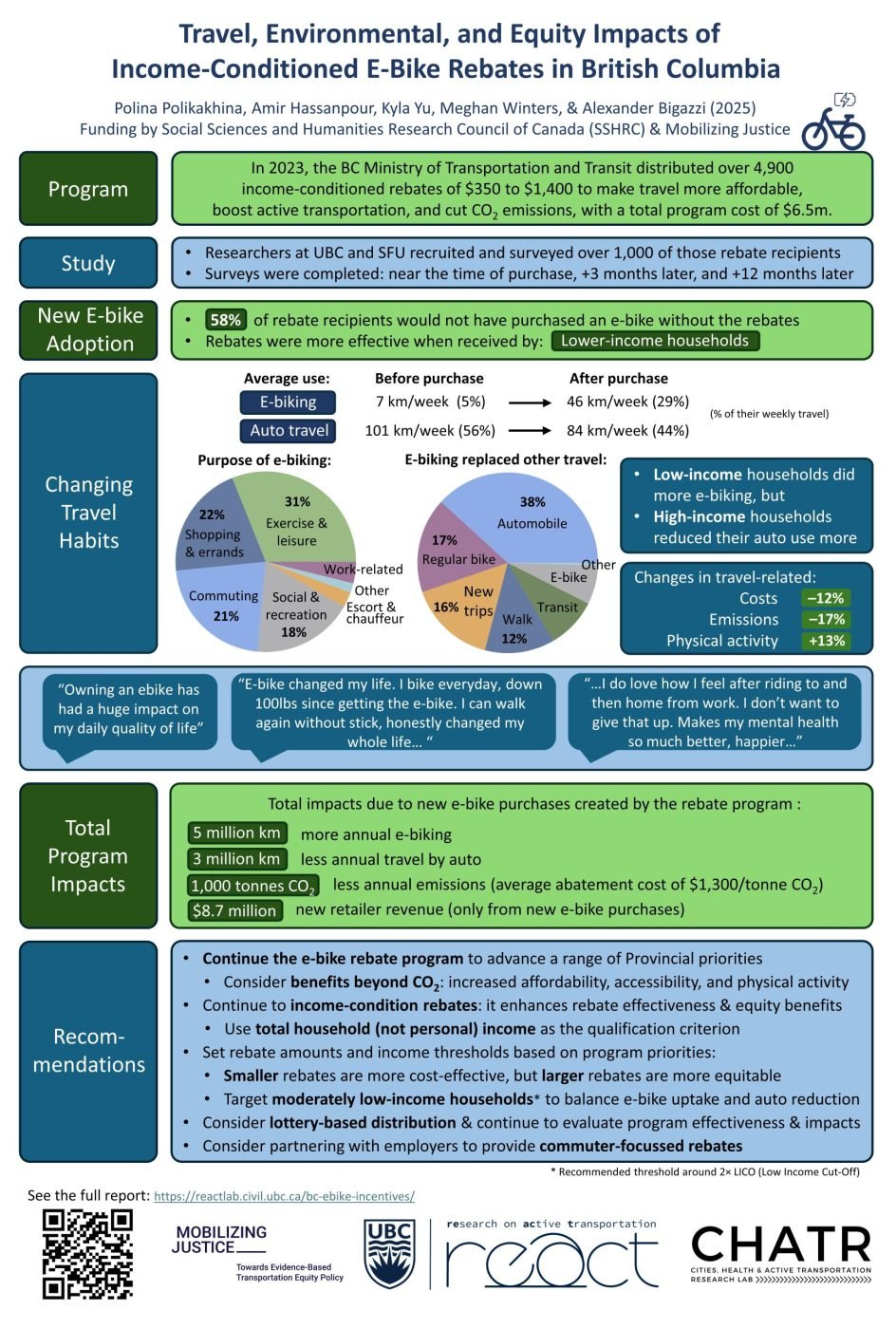

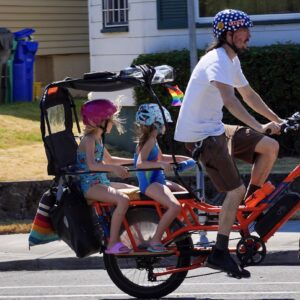
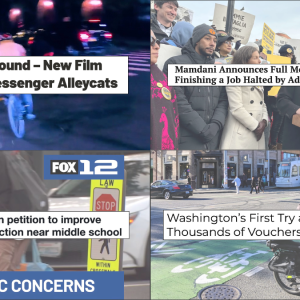
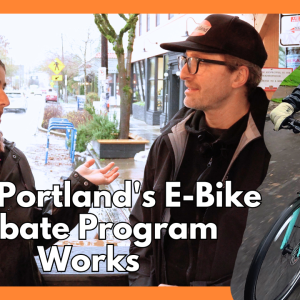
Thanks for reading.
BikePortland has served this community with independent community journalism since 2005. We rely on subscriptions from readers like you to survive. Your financial support is vital in keeping this valuable resource alive and well.
Please subscribe today to strengthen and expand our work.
So wild this is still happening in Portland can we strip some driver licenses away from the for life.. rant over
They also end up hurting local bike shops
Portland should definitely not allow pop-ups of direct to consumer e- bikes to use these vouchers.
Not in Portland, where you have to buy from a local bike shop.
Maybe we should institute a local tariff, for any goods not produced completely in Multnomah county should have to pay a tariff of 100%. Afterall, it’s working great at the federal level (/s), why not locally?
E-bikes are a danger to real bikes in bike lanes and paths.
Really? The only dangerous riding I’ve seen on paths has been the young men driving unregulated electric dirtbikes, not e-bikes. There’s a bit difference!
https://ebikes.org/ebike-classes-state-laws/
Modified Chinese Class 2/3 bikes are everywhere and behave just like motorcycles.
Not quite.
I have yet to see any modified Class 2/3 bicycle ridden across the Hawthorne Bridge bike/ped path at 40 mph doing wheelies, like I saw a young man do on an electric dirt bike a few weeks ago. I do believe you people have modded e-bikes to go faster, though, and I’m totally fine with regulating these completely out of existence and enforcing safe riding laws.
But maybe before we jump to regulating really useful and mundane e-bikes out of existence, we try addressing some of the concerns that people have.
Parks and Rec could start out with, say, some *signage* on the Springwater Corridor? I’d love to see…
If the City effectively reduced these three behaviors, I bet there’d be a lot less worry about the e-bike menace. If there was any effort to do so, I’m not aware of it, and I’m on the paths many times every week.
People complain on this website about e-bikes almost every time there’s an article mentioning them, but these noxious behaviors are not e-bike specific: motorcycles are not e-bikes, modded (illegal?) e-bikes abound, and regular bike riders *often* pass close and without warning.
But it takes way fewer words to blame “e-bikers” for anti-social behavior on our paths than it does to make the useful distinctions between users, as I try to do.
Nice way to dismiss people’s very real fears.
Just wait til you find out about all the cars in bike lanes and bike paths! E-bikes are at worst a nuisance.
I’m glad to finally see some research on how these actually work.
I still don’t understand why our bureaucrats trip over themselves to rebate lithium-powered devices but won’t lift a rebate finger for the bean-powered variety which I suspect would offer a better set of benefits to the individual and to society,
“bean-powered” bikes are already really cheap. You could get a decent used commuter bike for a couple hundred bucks. All in, bike + maintenance + some upgrades cost me $450. People who are willing and able to ride an acoustic bike to get around are pretty much already doing so. E-bikes enable the replacement of car trips for people who rarely if ever exercise. It is actually huge to be able to commute to work uphill on a hot day in regular clothes and not be a sweaty, panting mess when you get there.
“E-bikes enable the replacement of car trips for people who rarely if ever exercise.”
this is certainly the party line. Perhaps this study (I haven’t had a chance to read it yet) will bear this out, or perhaps not. The percentages listed in Jonathan’s article seem pretty modest to me.
Those percentages are definitely modest. I still see real value in rewarding early adopters and in seeding alternative transportation all over town. A program on this scale is not moving the needle on pollution as much as it is providing proof of concept for the idea of moving around without 1000 kilos of extra metal, glass, plastic and rubber. Yes the motor is a luxury when we compare your bike to an ebike. It’s also scaled down over 90 percent from what we call a car. That’s a percentage I can support.
Even after riding a whack looking cargo bike on Portland streets for 15 years I still encountered people who were interested, excited, and amazed to see that thing for the first time. It was literally a new idea for them. The ebike subsidies help move us up a couple of generations on a chain of influence that can leaven the population with the notion of what is possible.
There’s also a component of training mechanics so we have a broader knowledge base to support users and staff local shops. In another comment someone said that the subsidy is only applied at local retailers. I hadn’t read that but if so it will help keep local bike shops going at a time when economic insecurity makes it harder for anyone to do business.
I am torn about e-bikes. They are getting more people out of their cars and slowing down to the world at a more appreciative pace; however, my experience as a daily commuter is that people are running before they learn to walk. Almost daily, I have observed that the skillsets needed to operate a bike safely in a city are lost on most e-bike users. Simply saying “I rode a bike when I was a kid” doesn’t ensure safe operation of a fast and powerful machine without a steel cage and airbags…. It took me a long time to get my fitness up to 20-25mph on the flat. Along with the progression of speed, I learned a lot about pace, space, and etiquette/ safety. The injury rates of motorized bikes show this well:https://pubmed.ncbi.nlm.nih.gov/39981672/
I like how the e-bike skeptics are trying to have it both ways.
E-bikes are both not attracting new riders, just replacing regular bike rides, and also flooding our streets with inexperienced riders.
Can’t be both.
If they’re attracting so many inexperienced riders, that’s a problem that lasts all of a couple weeks. If the problem persists as you claim, that indicates a steady stream of new riders.
And the “problem” is overblown. Whatever real danger there is should be mitigated by safer infrastructure.
That’s funny- I hadn’t noticed that.
E-bikes are in a superposition of attracting inexperienced riders (who might be reducing carbon emissions by replacing a car trip), but also are just being used by experienced riders (to replace formerly carbon-free bike trips). So e-bikes bad because inexperienced people ride them unsafely AND bad because experienced riders replace their carbon-free bike.
The rhetorical genius of this is that if the complaint is behavior based, one could blame inexperienced riders (while ignoring that such a person would likely be replacing a car trip), but if the complaint is climate based, one could blame substitution for a bicycle trip (while ignoring that the experienced rider probably looks like they know what they’re doing on a bike).
My favorite example of this rhetorical jiu-jitsu comes from back in the good old days of the Forest Park mountain bike access controversy.
The anti-bike crowd was saying bikes shouldn’t be allowed in the southern parts of the park because that area was too crowded with hikers, and it would be dangerous to have bikes share the trail. The same crowd was also saying that bikes shouldn’t be allowed in the northern part of the Park because that area was so uncrowded that it had a lot of wildlife, and thus deserved a more stringent level of environmental protection!
In a way, the logic was airtight. On the other hand, it all seemed to proceed from the fact that the anti-bike activists just didn’t want us to exist.
Wait until you hear about all the people riding motorcycles and driving cars who aren’t good at etiquette and safety!
Surely we can agree it’s a lot better having them on ebikes than cars or motorcycles?
If they’re riding on bike paths and in bike lanes, then I definitely agree.
As a method of reducing CO2, these rebates are hugely expensive.
That may not matter for the Canadian program, if it’s funded through the general budget, but it definitely should for PCEF, which is spending money for a very specific purpose.
The study compares e-bike rebates to other CO2 saving measures/policies in the transportation sector and shows that these rebates were competitive and sometimes much more cost efficient than other strategies
“Using demographic data, researchers found that reductions in automobile use were greater for those with higher household income and those living in suburban areas that are relatively dense but with poorer access to destinations by walking, cycling, or public transit.”
That sounds like me! I moved from Powell and 42nd down to Milwaukie, but only on the condition that I buy an e-bike for my downtown commute. It has worked out really well, on the whole.
As long as housing prices remain so high in the city, e-bikes offer a way to maintain a low-car lifestyle, in spite of having to move further from the downtown core to buy a house.